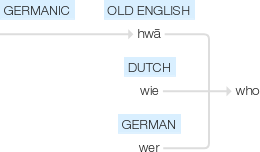Who
Old English hwā, of Germanic origin; related to Dutch wie and German wer .
wiktionary
From Middle English who, hwo, huo, wha, hwoa, hwa, from Old English hwā (dative hwām, genitive hwæs), from Proto-Germanic *hwaz, from Proto-Indo-European *kʷos, *kʷis.
The sound change /hw/ > /h/ (without a corresponding change in spelling) due to wh-cluster reduction after an irregular change of /aː/ to /oː/ in Middle English (instead of the expected /ɔː/) and further to /uː/ regularly in Early Modern English. Compare how, which underwent wh-reduction earlier (in Old English), and thus is spelt with h.
Compare Scots wha, West Frisian wa, Dutch wie, Low German we, German wer, Danish hvem, Norwegian Bokmål hvem, Norwegian Nynorsk kven, Icelandic hver.
etymonline
who (pron.)
Old English hwa "who," sometimes "what; anyone, someone; each; whosoever," from Proto-Germanic *hwas (source also of Old Saxon hwe, Danish hvo, Swedish vem, Old Frisian hwa, Dutch wie, Old High German hwer, German wer, Gothic hvo (fem.) "who"), from PIE root *kwo-, stem of relative and interrogative pronouns.
